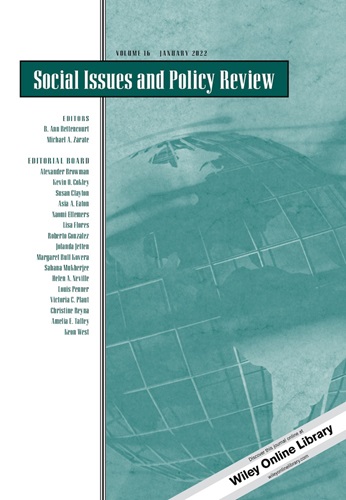How Groups Affect Our Health and Well‐Being: The Path from Theory to Policy
IF 5.6
1区 心理学
Q1 PSYCHOLOGY, SOCIAL
引用次数: 279
Abstract
Considerable evidence now exists that people can draw on social groups in order to maintain and enhance health and well-being. We review this evidence and suggest that social identity theorizing, and its development in the social identity approach to health and well-being, can help us to understand the way that groups, and the identities that underpin them, can promote a social cure. Specifically, we propose that social groups are important psychological resources that have the capacity to protect health and well-being, but that they are only utilized effectively when individuals perceive they share identity with another individual or group. However, as powerful as shared identities may be, their consequences for health are largely ignored in policy and practice. In this review, we offer a novel direction for policy, identifying ways in which building and consolidating group identification can help to capitalize effectively on the potential of group membership for health. Using this as a basis to increase awareness, we go further to offer practical interventions aimed at assessing identity resources as substantial and concrete assets, which can be cultivated and harnessed in order to realize their health-enhancing potential.群体如何影响我们的健康和福祉:从理论到政策的路径
现在有相当多的证据表明,人们可以利用社会群体来维持和增进健康和福祉。我们回顾了这些证据,并提出社会认同理论化,以及它在健康和幸福的社会认同方法中的发展,可以帮助我们理解群体的方式,以及支撑他们的身份,可以促进社会治疗。具体来说,我们提出社会群体是重要的心理资源,有能力保护健康和福祉,但只有当个人认为他们与另一个个人或群体有共同的身份时,这些资源才能得到有效利用。然而,尽管共同身份可能很强大,但它们对健康的影响在政策和实践中基本上被忽视了。在这篇综述中,我们为政策提供了一个新的方向,确定了建立和巩固群体认同的方法,可以帮助有效利用群体成员对健康的潜力。以此作为提高认识的基础,我们进一步提供实际干预措施,旨在评估身份资源作为实质性和具体的资产,这些资产可以加以培育和利用,以实现其增进健康的潜力。
本文章由计算机程序翻译,如有差异,请以英文原文为准。
求助全文
约1分钟内获得全文
求助全文
来源期刊

Social Issues and Policy Review
Multiple-
CiteScore
22.20
自引率
1.10%
发文量
9
期刊介绍:
The mission of Social Issues and Policy Review (SIPR) is to provide state of the art and timely theoretical and empirical reviews of topics and programs of research that are directly relevant to understanding and addressing social issues and public policy.Papers will be accessible and relevant to a broad audience and will normally be based on a program of research. Works in SIPR will represent perspectives directly relevant to the psychological study of social issues and public policy. Contributions are expected to be review papers that present a strong scholarly foundation and consider how research and theory can inform social issues and policy or articulate the implication of social issues and public policy for theory and research.
 求助内容:
求助内容: 应助结果提醒方式:
应助结果提醒方式:


